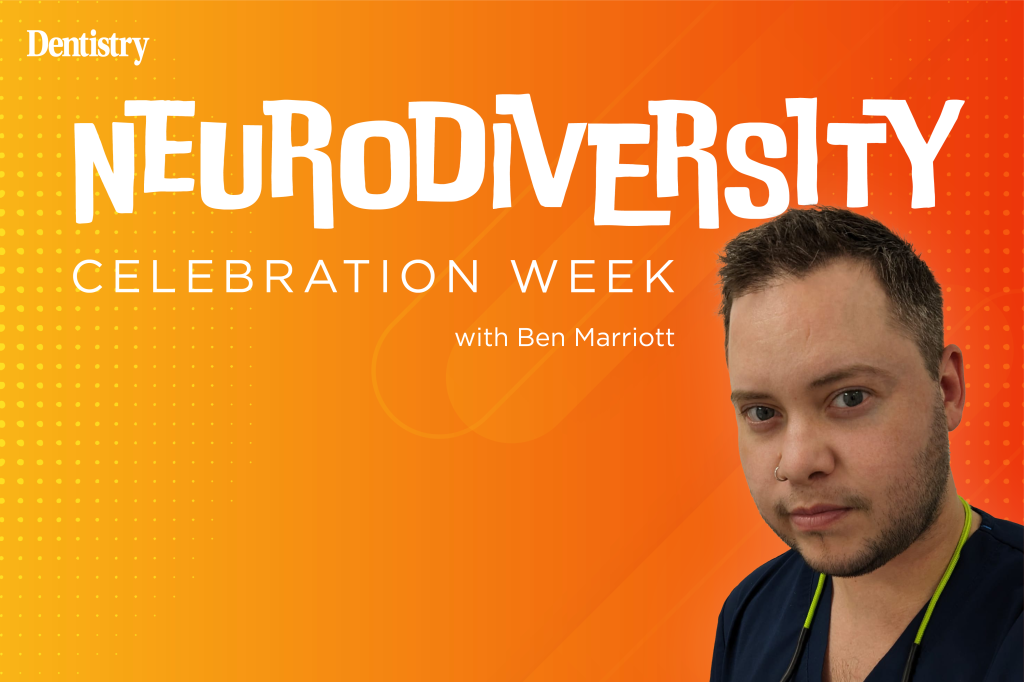
As we mark Neurodiversity Celebration Week, Ben Marriott explains what it is like living with ADHD and how it impacts his daily life in and outside of dentistry.
I’m a dental clinician living with undiagnosed and unmedicated ADHD. It’s very possible to be a successful dental clinician while neurodivergent but, as with all jobs, it’s not without its challenges.
A typical day for me starts with three alarm clocks and about 20 individual alarms. A lot of people with ADHD struggle with insomnia, and a lack of sleep is common.
I will arrive at work over an hour early, because the prospect of the stress of being stuck in traffic and starting my first patient late is unthinkable to me.
The day before I will have stayed behind to go through each patient for the next day, make detailed notes in my notebook about the treatment for each patient and put on templates in readiness for the day ahead. The odd patient is put in last minute of course, but I am filled with anxiety at the thought of working without preparation for the whole day. I need to know exactly what I’m doing at a glance.
Internal questions
I want to make time for a conversation with my nurse and my colleagues. Again, masking is common here. I’ve been told I interrupt people and get too excitable when speaking, so much so that I cut people off and it seems rude. So even something as simple as having a conversation requires a lot of mental energy.
Is it my turn to talk? Have I talked too much? Is the person getting bored and looking away? I find it difficult to concentrate on the details of other people’s lives, especially as I work in several different practices, so sometimes I feel rude if I haven’t remembered something a colleague has told me or remembered to ask how their holiday was.
I am usually excellent when dealing with patients – I have a script and I’m empathetic and good at listening to concerns. This part of the day comes quite easily to me (which is good what with it being the most important part of my job). Again, I write detailed notes about the patient’s social history so I know how to pick up a conversation next time.
I find writing my notes difficult with any sensory disturbance, whether that’s my nurse chatting, the radio on or colleagues speaking outside. Sometimes I turn the radio off and politely ask my nurse if they can just give me a minute to finish my notes.
Emotional sensitivities
I’m very aware of the need to run on time and have a large clock that I take with me so I can glance at it during treatment.
There’s a lot of effort and masking involved with the emotional sensitivities of dealing with rejection sensitive dysphoria, whether that’s an unhappy patient, a job application that wasn’t accepted, or the prospect that a colleague may not like me.
The conversation about mental health in dentistry, particularly with those who are neurodivergent, is long overdue. Even writing this article today leaves me wondering if my job prospects will be diminished as a result.
I can get really thrown off kilter and have to actively subdue my true feelings and emotions about a situation. Of course this is true of most people, but for those with ADHD these feelings are definitely more pronounced and require a large effort to not let it ‘spoil our day’.
Need for flexibility
At the end of a day’s work and concentration there is a feeling that my brain has actively switched itself off and I’m in a fog. Again, the mental energy required to get out of the car after the drive home is enormous and I will sometimes sit in my car for upwards of an hour.
What you will also find with people with ADHD is that all their energy and perfectionism is funnelled into doing an excellent job at work, whilst our home life is in disarray. So I will arrive home to a messy flat, no food in the fridge, medical appointments and financial obligations that have not been met.
Working in this profession is not as simple as altering my brain chemistry to be able to ‘relax’ or not feel the constantly elevated stress levels during the work day. For example, when one patient arrives before you’ve even finished with the last – you’re on a constant rollercoaster. Obviously seeing patients in a timely and prompt manner is essential for a practice to make a profit, but there needs to be flexibility.
Attitude needs to change
One of my practices has a 30-minute break mid-afternoon and the difference it makes to my mental wellbeing is enormous. I’ve come to realise the only way working in this profession is sustainable is with a healthy work-life balance. Reduced days so I have time to recover and do the tasks necessary for my own personal health and wellbeing.
I had a shock the other day when my best friend pointed out he hadn’t seen me for three months, because I had been so busy with work, organisations and lectures. The conversation about mental health in dentistry, particularly with those who are neurodivergent, is long overdue. Even writing this article today leaves me wondering if my job prospects will be diminished as a result.
There is a culture that suggests we have to have a stiff upper lip to be seen as professional or that we’re in the wrong job if we are struggling. This attitude needs to change and we need to look out for each other.
Follow Dentistry on Instagram to keep up with all the latest dental news and trends.


